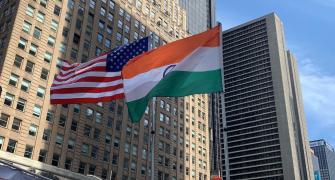“India and China are bound by history, connected by culture, and inspired by rich traditions. Together they can create a bright future for the entire mankind.”
“... the arithmetic and chemistry of our relations convince me that together we can script history and create a better tomorrow for all of mankind.”
Prime Minister Narendra Modi held a special interaction with Chinese media persons in New Delhi on the eve of the visit of Chinese President Xi Jinping where he summarized the possibilities of Sino-India bilateral ties.
Here’s the transcript:

China regards India as a natural co-operative partner. The Chinese government views China-India relations as one of its diplomatic priorities. In the future, what can the two countries do to make the relationship an even closer one?
I think that the special and unique nature of India-China relations rests in the fact that India and China are bound by history and connected by culture.
India and China both have rich traditions. India and China today constitute almost 35 per cent of the world’s population.
From a purely arithmetic point of view, the betterment of 35 per cent of the world’s population and eradication of poverty; that they decide to work together will open big gates for progress and development in the world.
It will not take long for the rest 65 per cent to rise as well. Arithmetically, if 35 per cent of the world’s population was to work together and to improve the economic conditions of its people through poverty alleviation method; then not only will 35 per cent of the world’s population grow enormously, but this will also lift very speedily the rest 65 per cent of the world’s population.
If you go back 300 years into history, the largest GDP contribution in the world used to come from India and China, who together contributed more than half of the world’s GDP.
Not only from the perspective of arithmetic, India and China also have common chemistry. Whenever India and China have worked and grown together, this has also led to the development and economic prosperity of the world.
You would have heard that in India, we call sugar in Hindi as cheeni. It is not known as cheeni for nothing. It is because of the Chinese technology that we were able to refine the sugar and make it pure and hence the people of India, started calling sugar as cheeni.
There is a history of deep ties between our people and between our countries. The arithmetic and chemistry of our relations convinced me that together we can script history and create a better tomorrow for all of mankind.
China has launched a new Silk Route initiative in recent years. Will it be an opportunity or threat to India in future?
The ancient trade routes in Asia included the Silk Route, the Spice Route and many other such routes. These were the channels of vibrant trade in the region and beyond and anchor of Asia prosperity.
These routes promoted the exchange of ideas, cultures, art, religion and spiritualism.
India, which was at the centre of several of these trade routes, shared its age-old wisdom with societies along these routes.
You are very well aware of the spread of message of peace of Lord Buddha through the ancient Silk Route.
It left a lasting impression on the Chinese civilisation. India also benefited from Chinese technology such as sugar refining. It is for this reason that sugar in India is called cheeni.
Successful revival of the ancient trade routes require not only physical connectivity and requisite infrastructure, but even more important, a climate of peace, stability, mutual trust and respect, support for mutual prosperity and free flow of commerce and ideas.
I believe that the re-emergence of the natural trading routes would make a major contribution to building a prosperous Asia in this century.
What do you think China and India can do together to promote peace and development in Asia and the world as a whole?
India and China are two ancient civilisations that have contributed much to this world through the ages.
Today, we are the world's two most populous countries and its two largest emerging economies.
The simultaneous transformation of our two countries, on a scale and at a speed that probably is unprecedented in history, provides enormous opportunities for our two countries to reinforce each other's growth and, at the same time, sustain Asia's economic resurgence and advance prosperity in the region.
We can do this by further strengthening our strategic communication; enhancing mutual trust and confidence; showing sensitivity to each other's concerns and interests; continuing to maintain a climate of peace, stability and tranquillity in our relations; and, seizing the opportunities for bilateral cooperation and international partnership.
The whole world now recognises you as a strong, practical, and decisive leader of India. China has high expectations of improvement in relations with India since you took office in May. Your government also attaches high importance to dealing with neighbouring countries. How would you re-define the Indo-China relations in the 21st century, especially in current world situation? What’s your blueprint or road map to develop the bilateral relations in your 5 years term? In the election campaign, you blamed the previous government for lacking the capacity to implement various promises; such as those on foreign policy. How do you propose to make a difference on upgrading India-China relations to a higher plane?
You have raised several important questions.
My government also attaches high priority to relations with China.
China is our largest neighbour. Relations between neighbours are always of special importance to each country, because their destinies are inter-linked. That is why I have also placed special emphasis on India's neighbourhood.
But, I don't see our relations with China only as a neighbour, with which we have had millennia old contacts.
China is important for the future of this region and the world.
There is a consensus that 21st century is Asia’s century.
If we look back in history, India and China had accounted for over 50 per cent of global GDP about 300 years ago.
We were the main sources of technology and ideas in the world. Our two civilisations have shown tremendous resilience and are now once again important centres of economic growth and innovation.
The centre of economic gravity is shifting towards Asia. As I said, the transformation of the lives of 2.5 billion people is a phenomenon of great significance for the region and the world.
Besides, in our inter-connected and inter-dependent world, all countries stand to benefit through enhanced cooperation.
We seek a closer developmental partnership. India can benefit from China’s strength in hardware such as creation of infrastructure and development of our manufacturing sector.
These are the areas where India wants to make rapid progress.
On the other hand, India’s strength in software can help Chinese companies to become more efficient and competitive. It offers opportunity for Indian companies to export services to China.
With joint efforts, we can strengthen our economic partnership. Enhanced tourism between us would help to increase people-to-people understanding. We can both benefit from a stronger regional and international partnership between our two countries.
I am also committed to realising India's full potential as also the promise of our international partnerships through appropriate policies and timely implementation of our national and international commitments.
I want to create an enabling environment in India that unleashes the enterprise and energy of our people and fully harnesses the benefits of international partnerships.
For enhancing and further strengthening bilateral relations, we should show mutual sensitivity to each other’s concerns and aspirations, follow the principle of mutual and equal security, seek closer developmental partnership and enhance people-to-people exchanges to create better understanding.
I am looking forward to deepening our engagement across the full spectrum of our bilateral relations, but also seeking progress on issues of concern, because resolution of these issues will transform the atmosphere in our relations and allow us to realise the full potential of our relations.
In the formal invitation presented to Chinese President Xi Jinping by National Security Adviser Ajit Doval, you invited him to visit Gujarat. The one reason we know is that Gujarat is your home state. Are there other special reasons or meanings for visiting there?
It is my effort that when foreign leaders visit India, they should also have opportunity to see places other than New Delhi.
It will give them a fuller idea of India and its diversity.
Relations between nations, especially large ones like India and China, should not be placed in the narrow confines of capital cities and major metropolitan centres.
China’s connection with Gujarat is very old.
In ancient days, there were vibrant trade relations between Gujarat and China.
Chinese monk Xuan Zang had spent a long time in Gujarat.
In present day, many Chinese businesses have established manufacturing units in Gujarat and vice-versa.
Chinese leaders have expressed interest in visiting Gujarat as they wish to understand the "Gujarat Model” of economic and social development.
I just wanted to say one final thing.
I would like to give a new terminology to my Wednesday meeting with the Chinese President.
I call it "Inch towards Miles”. INCH that is "India-China”; towards MILES that is- "Millennium of Exceptional Synergy”.
I believe that the meeting will mark a happy beginning towards this goal of "Inch towards Miles”.








